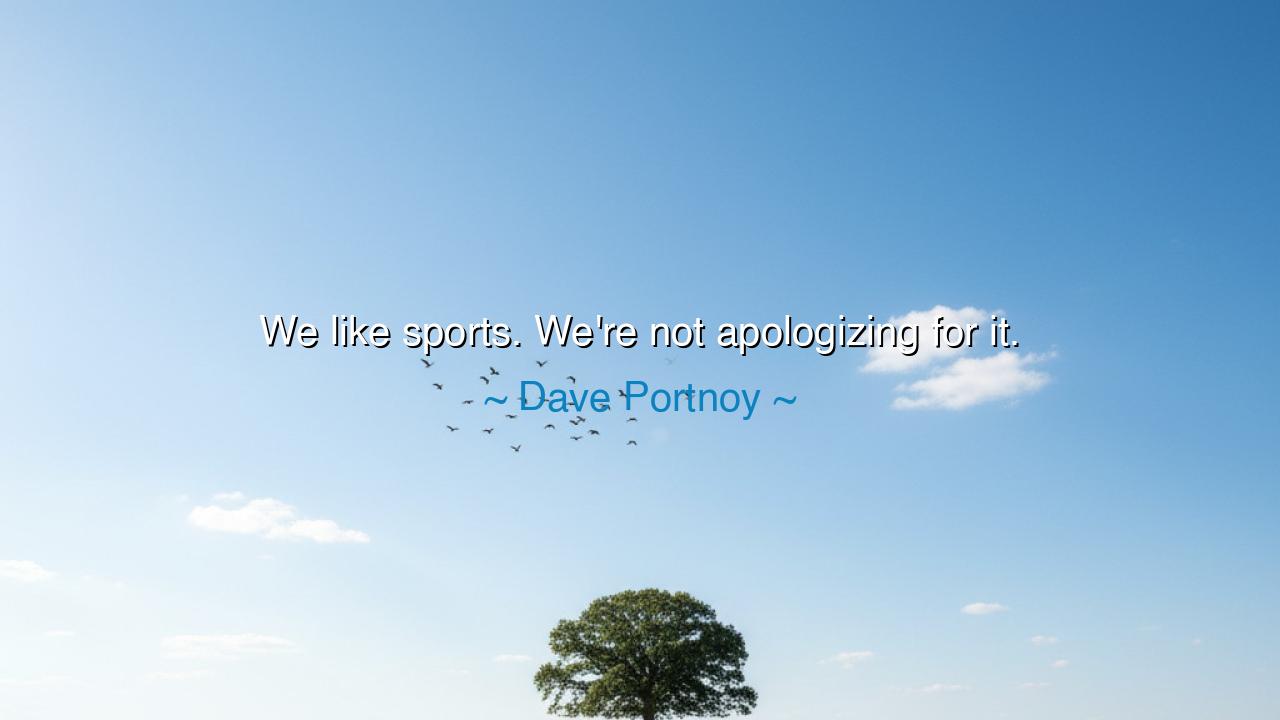
We like sports. We're not apologizing for it.






Dave Portnoy, the brash voice of an unapologetic era, once declared: “We like sports. We’re not apologizing for it.” These words, though simple in form, carry the resonance of defiance, of pride, of an ancient truth: that passion, when genuine, requires no defense. For in every age, men and women have been called to justify their loves, their pursuits, and their joys. But Portnoy’s creed is clear — if the heart finds meaning in the field of sports, then let it be pursued with honor, without shame, without apology.
At its core, this statement is about authenticity. To say “we like sports” is not merely to admit enjoyment of a pastime, but to affirm an allegiance to community, struggle, and triumph. Sports are more than games — they are theaters of human will, where sweat and discipline forge stories of courage. Yet in a world that often dismisses such passion as trivial, Portnoy’s defiance speaks loudly: what stirs the soul needs no validation. To enjoy fully and to proclaim boldly is to live without chains of false judgment.
The refusal to apologize also calls back to the wisdom of the ancients. The Greeks carved entire festivals — the Olympics — around the glory of athletic contests, and they did not shrink from celebrating the body as much as the mind. In Rome, though corrupted by spectacle, the arenas still symbolized the hunger for strength and glory. Throughout history, from village wrestling grounds to royal jousts, mankind has exalted sports as a mirror of life itself. Why then should any man or woman today apologize for cherishing what is rooted in the very marrow of human tradition?
Consider a story from modern times: Jackie Robinson, the first Black man to break Major League Baseball’s color barrier. To many, baseball was “just a game.” But Robinson’s courage on the diamond was a victory for justice far beyond the field. His presence in sports carried with it the weight of social change, proof that athletic passion is not trivial but transformative. In him we see that love of sports can be both deeply personal and universally significant.
Portnoy’s words also challenge us to stand by what we value. Too often, people bend under the weight of cultural scorn, apologizing for what gives them joy. But to live apologetically is to live half a life, enslaved to the opinions of others. Better, says Portnoy’s creed, to stand firm in your passion — whether in sports, art, music, or faith — and declare it without fear. For only then can you live in the fullness of your truth.
The lesson here is one of courage. To follow your passion openly requires strength, for the world is quick to judge. Yet history teaches that progress and meaning are built by those who stand unashamed of their loves. To say “I like this, and I will not apologize” is to claim your own ground, to forge your own identity, and to inspire others to do the same.
Practical action flows naturally: embrace your passions without hesitation. If sports stir your heart, pursue them with pride. If something else brings you joy, claim it boldly. Do not waste your days hiding what ignites your spirit. Instead, let your passions shape your life, your community, and your legacy. For the world is enriched not by those who apologize for who they are, but by those who live authentically, unafraid and unashamed.
Thus, Dave Portnoy’s words echo as a defiant hymn: “We like sports. We’re not apologizing for it.” Children of tomorrow, remember this: you need not excuse your joy, you need not justify your passions. For what fills your heart with fire is sacred, and to live without apology is to live in the fullness of freedom.






AAdministratorAdministrator
Welcome, honored guests. Please leave a comment, we will respond soon